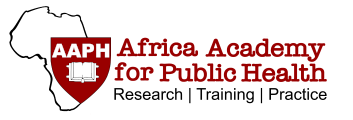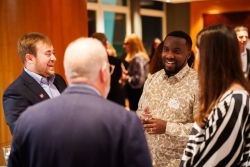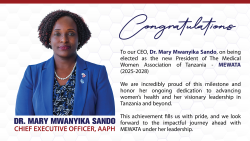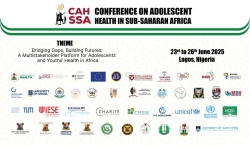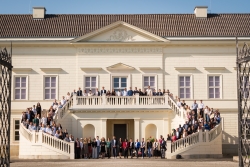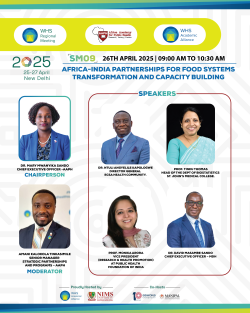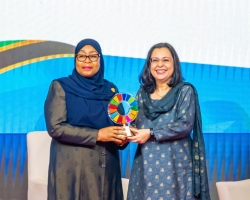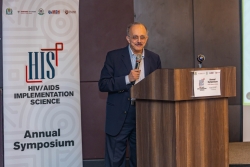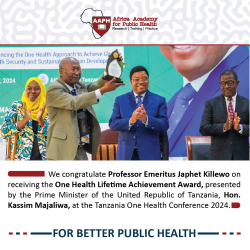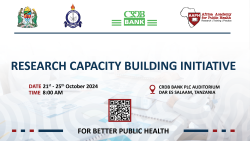We were proudly represented by Dr. Mary Mwanyika Sando (Chief Executive Officer) and Dr. Innocent Yusufu (Research and Programs Manager) at two key regional and global convenings held in Cape Town, South Africa: The Gathering (November 8–9, 2025) and the 7th Global Mental Health Summit (November 10–12, 2025).
Africa Academy for Public Health (AAPH) – being a Member of the World Health Summit (WHS) Academic Alliance - was invited to the WHS 2025 in Berlin, Germany themed ‘Taking Responsibility for Health in a Fragmenting World’.
We are proud to announce that our Chief Executive Officer, Dr. Mary Mwanyika Sando, has been elected as the new President of the Medical Women Association of Tanzania (MEWATA) during the Association’s 22nd Annual General Meeting, held on August 23, 2025, in Arusha. At AAPH, we celebrate this achievement with immense pride and look forward to supporting Dr. Mary and her team in this important leadership role, which will continue to transform lives and advance women’s health across the nation #ForBetterPublicHealth.
Following the very successful June 2024 Inaugural Conference on Adolescent Health in Sub-Saharan Africa (CAH-SSA) in Addis Ababa, Ethiopia featuring the Launch of the African Think Tank for Adolescents and Youths Health (ATTAYH); Celebration of the ARISE Network 10th Anniversary; and the concurrent Meetings, Trainings, Presentations and Workshops - the ARISE Network hosted CAH-SSA 2025 in Nigeria for the first time in its history. The University of Ibadan Research Foundation (UIRF) and Africa Academy for Public Health (AAPH) successfully led this event to mark a significant milestone in the effort of the ARISE Network towards bring impacts on adolescents and youth in Africa. This historic 4 days' event took place in Lagos, Nigeria from 23rd to 26th June 2025.
From June 11-13 2025, Africa Academy for Public Health (AAPH) representatives joined over 150 delegates from 30+ countries in Hanover, Germany, at the “Youth Loneliness in Africa” symposium, co‑organized by Charité – Universitätsmedizin Berlin, Stanford University, and AAPH. Under the leadership of Prof. Dr. Shuyan Liu (Charité), Prof. Dr. Maya Adam (Stanford), and Dr. Mary Mwanyika Sando (AAPH), the three‑day event aimed to peel back the layers of loneliness in Africa, moving beyond universal definitions to culturally anchored understandings.
To achieve the 2030 SDGs with the ambition of ending extreme poverty, hunger, and all forms of malnutrition, the importance of South-South cooperation has never been more crucial, and the roles of both Africa and India are central to this course. This side meeting, the first of its kind, at the World Health Summit will bring together interdisciplinary global public health leaders, Academics, researchers, development professionals, NGOs, private sector representatives, and government and international organizations and foster collaboration and partnerships for food systems transformations and capacity building.
<p>The Africa Academy for Public Health (AAPH) extends its heartfelt congratulations to Her Excellency President Dr. Samia Suluhu Hassan, President of the United Republic of Tanzania, on receiving the prestigious Goalkeepers Award from the Gates Foundation on February 4, 2025, in Dar es Salaam, Tanzania. This award recognizes Tanzania’s remarkable progress in maternal, newborn, child nutrition, and health (MNCNH)—a testament to the country’s commitment to improving health outcomes for women and children.</p>
Strengthening HIV/AIDS Implementation Science in Tanzania: Highlights from the 8th HIS Annual Symposium 2025: Held under the theme “Progress in Capacity Building for HIV/AIDS Implementation Science in Tanzania,” the full day’s symposium convened researchers, policymakers, health professionals, and HIS fellows to reflect on progress, share new evidence, and chart forward-looking strategies. It also served as a follow-up to discussions initiated in the 2024 (7th) symposium, which focused on HIV, nutrition, and non-communicable diseases (NCDs), recognizing the increasing double burden of under- and overnutrition among people living with HIV.
The Africa Academy for Public Health extends our heartfelt congratulations to Professor Emeritus Japhet Killewo for receiving the One Health Lifetime Achievement Award. Working alongside him in our shared mission to improve public health outcomes has been a privilege. His legacy will continue to inspire and guide the next generation of public health practitioners and researchers For Better Public Health.
The Africa Academy for Public Health (AAPH), a Tanzanian non-profit organization, conducted a five-day training on Health Research from October 21st to October 25th, 2024 at the CRDB Bank Plc Auditorium in Dar es Salaam. This training aligns with AAPH’s mission to advance public health priorities through research, capacity building, and knowledge translation.
